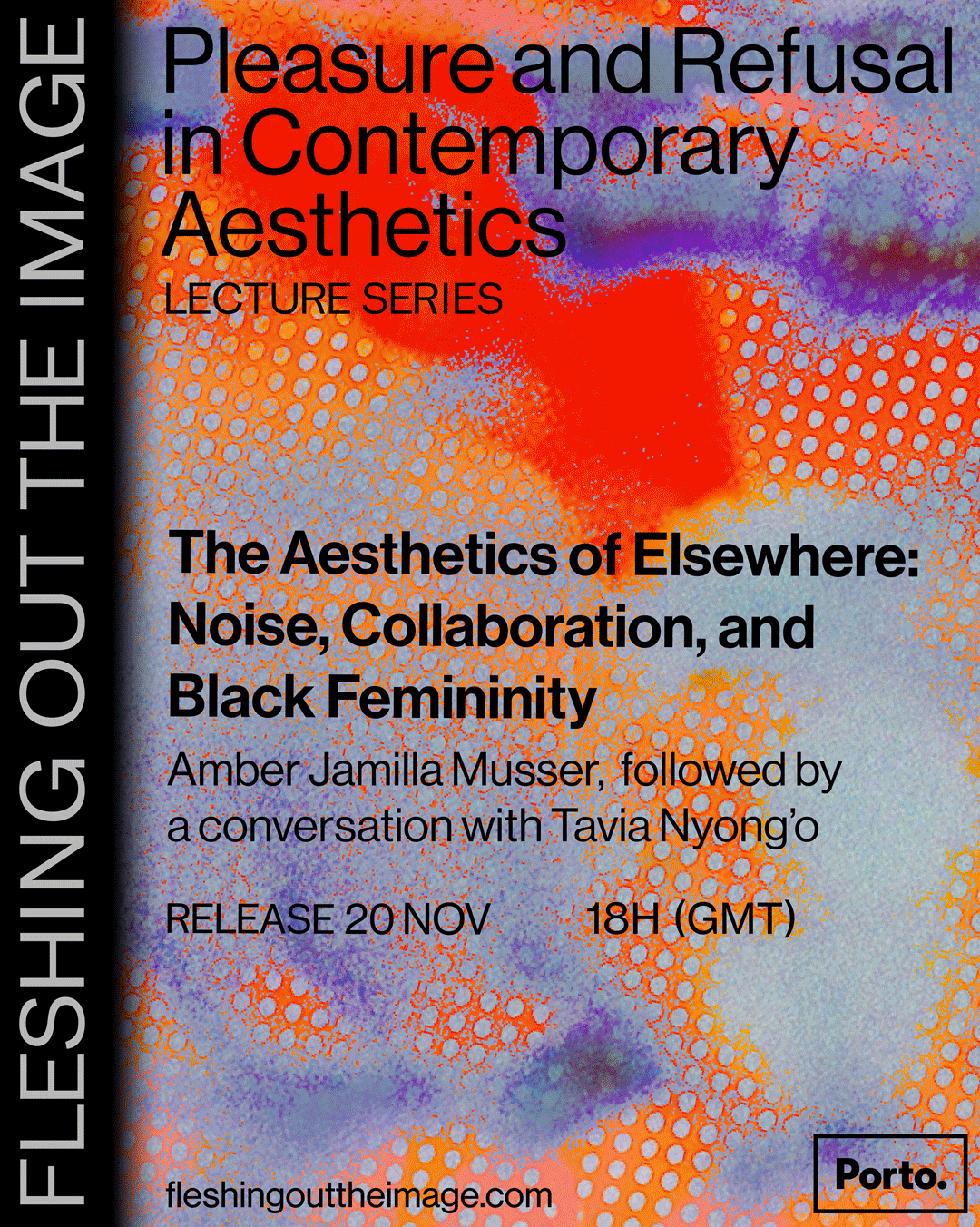The lecture series Fleshing out the Image: Pleasure and Refusal in Contemporary
Aesthetics seeks to explore the potential of enfleshment as a mode of sensual and
political refusal. The series homes in on the role of the senses – understood as the sensorial
engagement with visual-sonic-tactile worlds as well as a realignment of the field of aesthetics
– in the creation of imaginaries of refusal and ways of living otherwise.
The first session features a talk by Amber Jamilla Musser, followed by conversation with Tavia
Nyong’o. In this talk, Musser expands her thinking on “brown jouissance” through an engagement
with the work of visual artist Jacolby Satterwhite. Reading Satterwhite’s curation of his
mother’s work as a “maternal elsewhere”, Musser proposes to read his practice through noise, as
“an elsewhere that offers a form of adjacency and which is accessible through the sensual”.
The second session presents a talk by Zakiyyah Iman Jackson, followed by a dialogue with Denise
Ferreira da Silva. The talk draws on Sylvia Wynter’s essay “Rethinking ‘Aesthetics’: Notes
towards Decipherment” to reexamine the meaning of aesthetics and challenge the continuities
between the culture of literary, film, and art criticism and the culture of the gene in the
biological sciences.
The final session features a talk by Tina Campt, followed by a conversation with Alexander Ghedi
Weheliye. Tina Campt’s talk will explore what she terms “practices of refusal” enacted by Black
contemporary artists who use negation as a generative and creative source of disorderly power to
embrace the possibility of living otherwise”.
The Aesthetics of Elsewhere:
Noise, Collaboration, and Black
Femininity
Amber Jamilla Musser, followed by
a conversation with Tavia Nyong’o
English subtitles available. Click on CC.
Amber Jamilla Musser is an Associate Professor of American Studies at George
Washington University. Her research is at the intersection of aesthetics, race, gender, and
sexuality studies. Dr. Musser has also published widely on race and critical theory, queer
femininities and race, race and sexuality, and queer of color critique. She is particularly
interested in thinking about what constitutes the flesh. Her first book, Sensational
Flesh: Race, Power, and Masochism (New York University Press, 2014), uses masochism
as a lens to theorize different felt relationships to power. Her second book Sensual
Excess: Queer Femininity and Brown Jouissance (New York University Press, 2018),
which received a 2018 Arts Writer’s Grant from the Warhol Foundation, turns toward sensation
and aesthetics in order to imagine epistemologies of sensuality that emerge from fleshiness.
She also coedited, along with Kadji Amin and Roy Pérez, Queer Form: Aesthetics, Race, and
the Violences of the Social, a special issue of ASAP/Journal (May 2017).
Currently, she is beginning a project on noise, ethics, and aesthetics. She also writes art
reviews for Brooklyn Rail.
Tavia Nyong’o is Chair and Professor of Theater & Performance Studies, Professor of
American Studies, and Professor of African-American Studies at Yale University. His current
research and teaching interests span black queer cultural and performance studies,
contemporary art and aesthetic theory, speculative genres, afrofuturism, and black sound
studies. Nyong’o’s first book, The Amalgamation Waltz: Race, Performance, and the Ruses
of Memory (2009) won the Errol Hill award for the best book in black theater and
performance studies. His second book, Afro-Fabulations: The Queer Drama of Black Life
(2018) won the Barnard Hewitt award for best book in theater and performance studies. He
edits the Sexual Cultures book series at NYU Press with Ann Pellegrini and Joshua
Chambers-Letson. Nyong’o also writes for contemporary art and culture publications such as
Artforum, Texte Zur Kunst, Cabinet, n+1, NPR, and the
LA Review of Books. In 2019, he curated “Dark as the Door to a Dream” at the
Stedelijk Museum in Amsterdam, as part of the Studium Generale Rietveld Academie. In 2017,
he co-curated “The Critical Matter of Performance” at the New Museum for Contemporary Art.
Against Criticism:
Notes on Decipherment and the Force of Things
Zakiyyah Iman Jackson, followed by a conversation with Denise Ferreira da Silva
Zakiyyah Iman Jackson is an Assistant Professor of English at the University of
Southern California. Her research explores the literary and figurative aspects of Western
philosophical and scientific discourse and investigates the engagement of African diasporic
literature and visual culture with the historical concerns, knowledge claims, and rhetoric
of Western science and philosophy. She is the author of Becoming Human: Matter and
Meaning in an Antiblack World (New York University Press, 2020). Becoming
Human argues that key African American, African, and Caribbean literary and visual
texts generate conceptions of being and materiality that creatively disrupt a human-animal
distinction that persistently reproduces the racial logics and orders of Western thought.
These texts move beyond a critique of bestialization to generate new possibilities for
rethinking ontology: our being, fleshly materiality, and the nature of what exists and what
we can claim to know about existence. Jackson is at work on a second book, tentatively
titled “Obscure Light: Blackness and the Derangement of Sex-Gender.” She has published in
Feminist Studies; Qui Parle: Critical Humanities and Social Science;
Catalyst: Feminism, Theory, Technoscience; South Atlantic Quarterly (SAQ);
e-flux; and twice in Gay and Lesbian Quarterly (GLQ).
An academic and practicing artist, Denise Ferreira da Silva’s work addresses the
ethico-political challenges of the global present. She is the author of Toward a Global
Idea of Race (University of Minnesota Press, 2007), A Dívida Impagável
(Oficina da Imaginaçāo Política and Living Commons, 2019), Unpayable Debt
(Stenberg/MIT Press, forthcoming) and co-editor (with Paula Chakravartty) of Race,
Empire, and the Crisis of the Subprime (Johns Hopkins University Press, 2013). Her
several articles have been published in leading interdisciplinary journals, such as
Social Text, Theory, Culture & Society, Social Identities, PhiloSOPHIA,
Griffith Law Review, Theory & Event, The Black Scholar, to name a few.
Her artistic works include the films Serpent Rain (2016) and 4Waters-Deep
Implicancy (2018), in collaboration with Arjuna Neuman; and the relational art
practices Poethical Readings and Sensing Salon, in collaboration with Valentina
Desideri. She has exhibited and lectured at major art venues, such as the Pompidou Center
(Paris), Whitechapel Gallery (London), MASP (Sāo Paulo), Guggenheim (New York), and MoMa
(New York). She has also written for publications for major art events (Liverpool Biennale,
2017; São Paulo Biennale, 2016, Venice Biennale, 2017, and Documenta 14) and published in
art venues, such as Canadian Art, Texte Zur Kunst, and e-flux.
Tina Campt, followed by a conversation with Alexander Ghedi Weheliye
Tina Campt is Owen F. Walker Professor of Humanities and Modern Culture and Media at
Brown University and a Research Associate at the Visual Identities in Art and Design
Research Centre (VIAD) at the University of Johannesburg, South Africa. Campt is a black
feminist theorist of visual culture and contemporary art. She is the author of three books:
Other Germans: Black Germans and the Politics of Race, Gender and Memory in the
Third Reich (2004), Image Matters: Archive, Photography and the African Diaspora
in Europe (2012), and Listening to Images (2017). Her forthcoming book, A
Black Gaze, will be published by MIT Press in 2021.
Alexander Ghedi Weheliye is professor of African American Studies at Northwestern
University where he teaches black literature and culture, critical theory, social
technologies, and popular culture. He is the author of Phonographies: Grooves in Sonic
Afro-Modernity (2005) and Habeas Viscus: Racializing Assemblages, Biopolitics,
and Black Feminist Theories of the Human (2014). Currently, he is working on two
projects. The first, Feenin: R&B’s Technologies of Humanity, offers a critical
history of the intimate relationship between R&B music and technology since the late 1970s.
The second, Black Life/SchwarzSein, situates Blackness as an ungendered ontology of
unbelonging.







